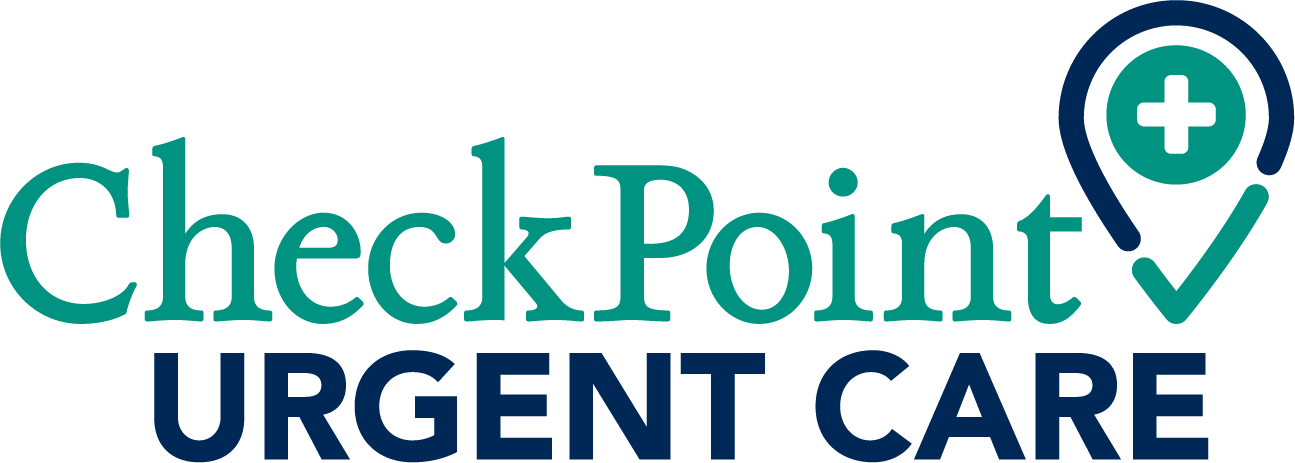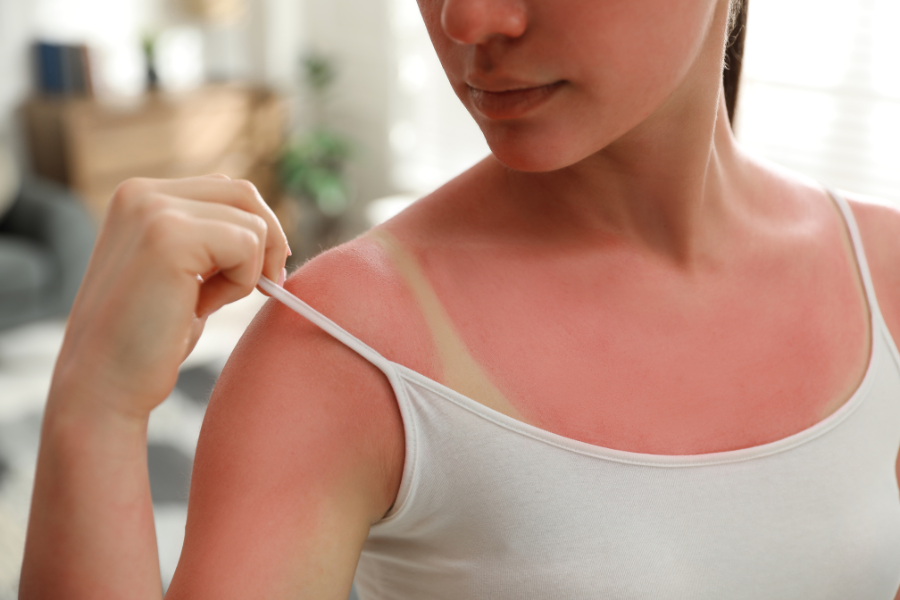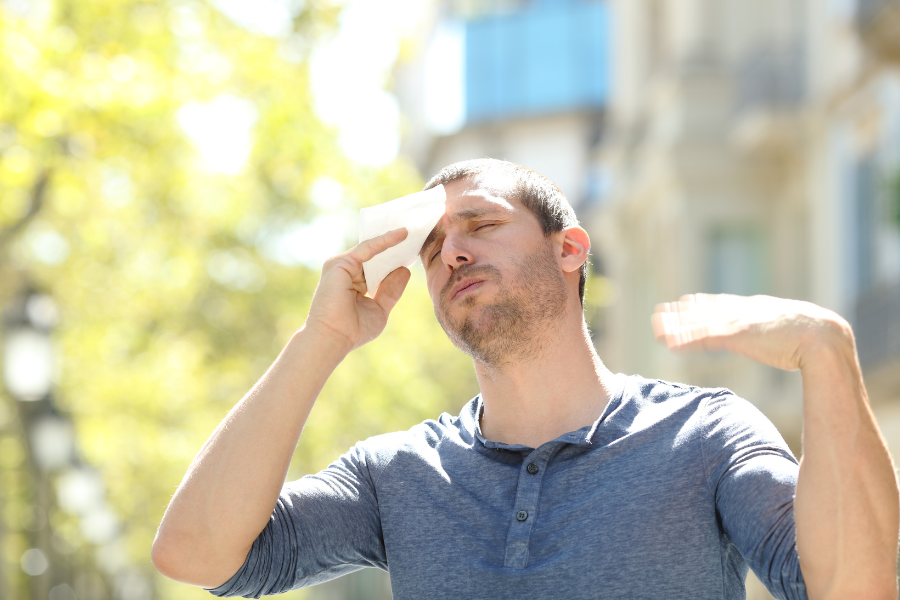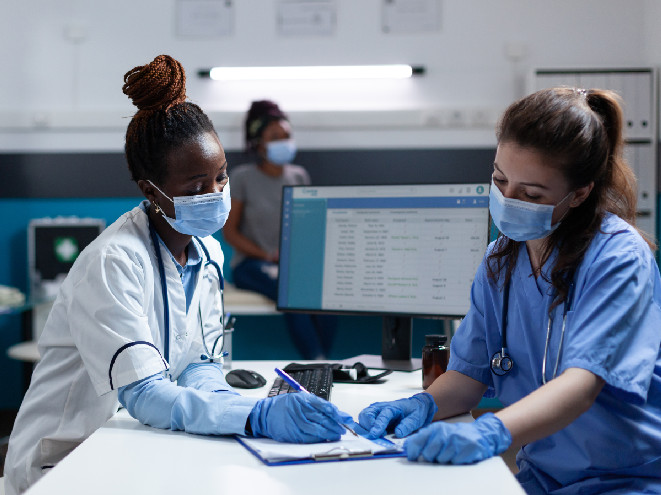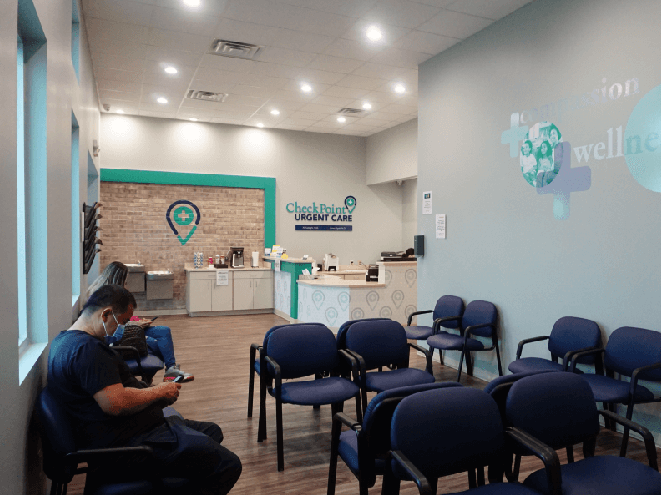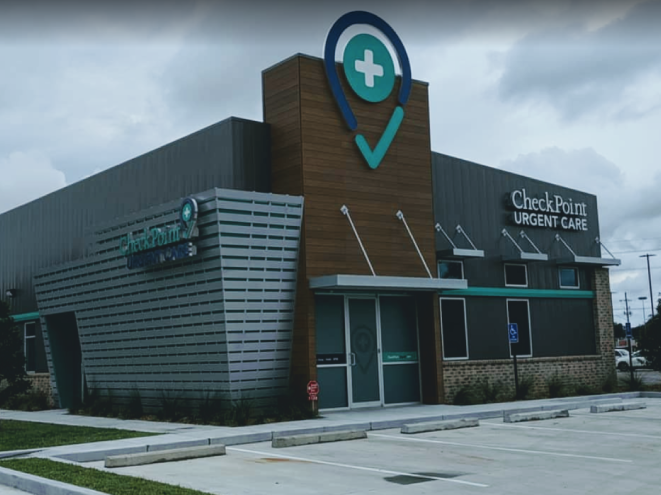Sunburn is a condition where the skin becomes inflamed, painful, and hot to the touch after prolonged exposure to the sun’s ultraviolet (UV) rays. It typically appears within a few hours of overexposure. Although relief can be found through self-care measures such as taking pain relievers and cooling the skin, sunburn can take several days to fade. There are also certain cases when you should visit CheckPoint Urgent Care or the emergency room. Learn more about the symptoms, treatment, and risks of sunburn.
Sunburn
Prevention of sunburn is crucial year-round, and everyone should practice skin-protection habits like wearing sunscreen. This is particularly important when spending time outdoors, even on cloudy or cool days. By taking preventative measures, you can reduce the risk of sunburn and potential long-term damage to your skin.
Symptoms Of Sunburn
Sunburn can occur on any part of the body that is exposed to the sun, including the scalp, earlobes, and lips. Even areas covered with clothing can be affected if the clothing has a loose weave that allows UV light to pass through. The eyes are also susceptible to sunburn as they are highly sensitive to UV light.
Symptoms of sunburn can vary and may include:
- Skin inflammation, which may appear pink or red on fair skin and can be harder to spot on darker skin tones
- Warmth or heat in the affected area
- Pain, tenderness, and itching
- Swelling
- Small blisters filled with fluid, which may rupture
- Headache, fever, nausea, and fatigue in severe cases
- Gritty or painful sensation in the eyes
Symptoms of sunburn typically appear within a few hours after sun exposure. The body may start to heal itself within a few days by peeling off the damaged skin’s top layer. However, severe sunburn may take several days to heal, and any changes in skin color usually fade over time. It is important to take precautions to prevent sunburn to avoid long-term damage to the skin.
Treatment Of Sunburn
Sunburn treatment doesn’t heal your skin, but it can ease pain, swelling, and discomfort. If care at home doesn’t help or your sunburn is very severe, a healthcare provider might suggest a prescription corticosteroid cream.
A healthcare provider might admit you to a hospital for severe sunburn.
At-Home Treatment
Here are some self-care tips to relieve sunburn:
- Take a non-prescription pain reliever such as ibuprofen or acetaminophen, or apply a gel pain reliever directly to the skin.
- Cool the skin by using a clean towel dampened with tap water or taking a cool bath with baking soda.
- Apply a soothing moisturizer, lotion, or gel-like aloe vera, or calamine lotion. Avoid alcohol-based products.
- Drink extra water to prevent dehydration.
- Leave blisters alone if they are intact. Trim off any dead skin with clean scissors if they break. Gently clean the area and apply an antibiotic ointment and non-stick bandage.
- Treat peeling skin with moisturizer and avoid peeling it off.
- Take an oral antihistamine such as diphenhydramine to relieve itching.
- Apply non-prescription 1% hydrocortisone cream to the affected area three times a day for mild to moderate sunburn.
- Use cool tap water on sunburned eyes, and avoid wearing contact lenses or rubbing your eyes.
- Protect yourself from further sun exposure with sun protection measures such as wearing sunscreen and protective clothing.
- Avoid using ‘-caine’ products like benzocaine, which can irritate the skin or cause an allergic reaction. Never use more than the recommended dose; talk to a healthcare provider before using it. Children under age 2 should not use benzocaine without supervision from a health care provider.
Risk Factors For Sunburn
There are several factors that increase the risk of sunburn. Having white skin and red hair, a history of sunburn, working outdoors, living in a sunny or warm climate or at high altitudes, and regularly exposing unprotected skin to UV light are all risk factors. Swimming or spraying the skin with water or baby oil can also increase the risk of sunburn, as wet skin tends to burn more than dry skin. Additionally, mixing outdoor recreation with alcohol consumption and taking photosensitizing medication can also increase the risk of sunburn.
Repetitive and severe sun exposure that leads to sunburn heightens the chances of developing various skin conditions and diseases. These encompass premature aging of the skin (photoaging), precancerous skin growths, and skin cancer.
Exposure to the sun can have detrimental effects on the skin, including premature aging, known as photoaging. The skin’s connective tissues can weaken, leading to decreased elasticity and deep wrinkles, as well as dryness, roughness, and fine red veins. Freckles and dark spots on the face, shoulders, chest, and upper back can also result from UV exposure. Sun damage can lead to precancerous skin lesions or actinic keratoses, which can evolve into skin cancer. Excessive sun exposure can increase the risk of developing skin cancer, such as melanoma, even without sunburn. Skin cancer commonly develops on the scalp, face, lips, ears, neck, chest, arms, hands, legs, and back. It may appear as a small growth, sore, or suspicious-looking mole. Eye damage is also possible due to UV exposure, which can cause painful or gritty sunburn of the cornea, clouding of the lens, or cataracts. It’s important to see a healthcare provider if any new skin growth or bothersome changes in the skin occur, if there are changes in the look or texture of a mole, or if a sore doesn’t heal.
When To Visit CheckPoint Urgent Care
If you are experiencing a more severe sunburn, visit CheckPoint Urgent Care if you:
- Develop large blisters
- Develop blisters on the face, hands, or genitals
- Experience severe swelling of the affected area
- Show signs of infection, such as blisters with pus or streaks
- Experience worsening pain, headache, confusion, nausea, fever, or chills
- Get worse despite at-home care
- Have eye pain or vision changes
Seek emergency medical care if you are sunburned and experience:
- A fever over 103F with vomiting
- Confusion
- An infection
- Dehydration
- Cold skin, dizziness, or faintness
If you are sunburned and experience any of the symptoms mentioned above, it is important to seek medical attention as soon as possible.
Additionally, there are steps you can take to prevent sunburns in the future. These include seeking shade during peak sun hours, wearing protective clothing, such as hats and long-sleeved shirts, and using sunscreen with an SPF of at least 30. It’s important to apply sunscreen at least 15 minutes before going outside and reapply every two hours or after swimming or sweating. Protecting your skin from the harmful effects of the sun can help prevent not only sunburns but also more serious skin damage and diseases such as skin cancer.
Visit any one of our locations for moderate sunburn treatment. We have offices located in New Iberia, Opelousas, and Crowley. If you aren’t sure if you should seek medical treatment, feel free to contact us.
